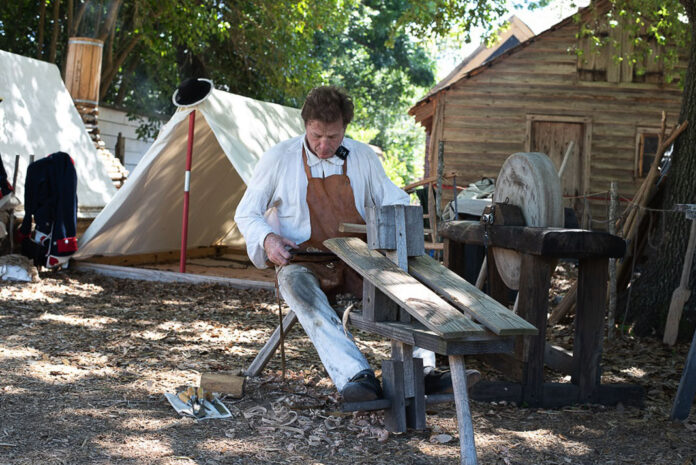Behind the Palace gates, under one of our huge live oaks, is our newest living history program, the Encampment Interpretive Area, where 18th c. military life is interpreted daily. The Encampment began in 2020 when COVID restrictions shut down all indoor activities. It was so well received, that Gary Riggs, Interpretive Programs Coordinator, began expanding the site – using authentic 18th c. hand tools. By the spring of 2022, the Encampment had doubled in size and now allowed space for civilian life demonstrations. All military encampments encompassed various forms of daily life that overlapped with civilian life. Wives, mothers, and sisters of soldiers often followed their loved ones and became a part of military camp life. These women became laundresses, cooks, nurses and healers, whose labors made survival possible between military encounters during long marches and extended campaigns.
If you haven’t visited the Palace grounds recently, visiting the encampment is your reason to do so! The interpreters have implemented a weekly schedule of hands-on living history topics and activities. Occurring daily, these special demonstrations take place Monday-Saturday at 11:15 a.m., 12:15 p.m. and 1:15 p.m., and are sure to increase your understanding of military life in the 18th century. A fun and wonderful experience for all!
Mondays – Coffee and Chow – Making an 18th c. cup of joe was not fast and easy; come watch how it was done. Additionally, a rotating list of camp recipes will be cooked, including ash cakes, dumplings, and more.
Tuesdays – Apothecary- Making Medicines and Tinctures. Come learn the ingredients 18th-century medicines and the processes used to make them.
Wednesdays – Carpentry and Woodworking. The encampment meets its own woodworking needs. On this day you might see interpreters making pegs, shovels, rakes, and other items.
Thursdays – Weaponry of the Times. Period bladed weapons and flintlock firearms, ranging from officer’s swords to knives and pistols to muskets will be showcased. There will be scheduled firing demonstrations using a reproduction French Charleville musket.
Fridays – Luck-of-the-Draw Day. The camp focuses on civilian activities and may include making bandages, cleaning pots with ash, dyeing, spinning, papermaking, writing with quill pens, candle making, and more.
Saturdays – Interpretation of The Camp. Learn about life in an 18th-century military camp from fire-starting to sheltering.
The encampment is so busy that the interpreters are taking on a new adventure in trade. Our Museum Shop now carries some items that are made at the Encampment. Look for wool skeins, beautiful, hand-crafted walking sticks and more!
Our interpreters have also expanded a textiles program through generous donations of additional wheels and winders. The new spinning and weaving program has inspired our weavers to offer a series of demonstrations on the craft and history of textiles in this part of North Carolina. During National Weaving Week, October 3-9, there will be demonstrations offered daily. Join us in the Gateway Gallery at the NC History Center.

